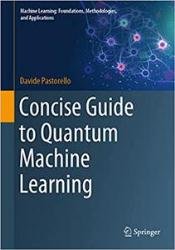Concise Guide to Quantum Machine Learning
- Добавил: literator
- Дата: 23-12-2022, 14:21
- Комментариев: 0
 Название: Concise Guide to Quantum Machine Learning
Название: Concise Guide to Quantum Machine LearningАвтор: Davide Pastorello
Издательство: Springer
Серия: Machine Learning: Foundations, Methodologies, and Applications
Год: 2023
Страниц: 144
Язык: английский
Формат: pdf (true)
Размер: 10.2 MB
This book offers a brief but effective introduction to Quantum Machine Learning (QML). QML is not merely a translation of classical machine learning techniques into the language of quantum computing, but rather a new approach to data representation and processing. Accordingly, the content is not divided into a “classical part” that describes standard machine learning schemes and a “quantum part” that addresses their quantum counterparts. Instead, to immerse the reader in the quantum realm from the outset, the book starts from fundamental notions of quantum mechanics and quantum computing. Avoiding unnecessary details, it presents the concepts and mathematical tools that are essential for the required quantum formalism. In turn, it reviews those quantum algorithms most relevant to Machine Learning. Later chapters highlight the latest advances in this field and discuss the most promising directions for future research.
Quantum machine learning (QML) is a rapidly emerging research area where the power of quantum computing is applied to Machine Learning tasks in order to pursue computational advantages in view of the present context of ever-growing amounts of data to manage. More generally, QML turns out be a promising path to explore new opportunities offered by quantum machines, both the existing ones and those not yet built. It is currently a hot topic within the scientific communities working on quantum technologies and attracts interests also from industries and non-academic institutions which are excited by the idea of dealing with big data running Machine Learning algorithms on quantum computers. This volume essentially provides an introduction to the possibilities offered by quantum computers to Machine Learning discussing the fundamental aspects and presenting an overview on the most recent and remarkable developments in this scientific and technological area.
Data encoding into quantum states and information processing based on quantum phenomena like quantum superposition and quantum entanglement can be used to formulate Machine Learning schemes within the well established framework of quantum computing. QML algorithms may present relevant advantages with respect to classical machine learning algorithms in terms of time and space complexity. Remarkable examples are given by the embedding of quantum subroutines (such as Qdist) into Machine Learning schemes to efficiently calculate distances in the feature space with advantages in classification and clustering or Grover-based subroutines to find an item in an unsorted database, with a quadratic speedup with respect to exhaustive search, applied to pattern recognition.
Скачать Concise Guide to Quantum Machine Learning
Внимание
Уважаемый посетитель, Вы зашли на сайт как незарегистрированный пользователь.
Мы рекомендуем Вам зарегистрироваться либо войти на сайт под своим именем.
Уважаемый посетитель, Вы зашли на сайт как незарегистрированный пользователь.
Мы рекомендуем Вам зарегистрироваться либо войти на сайт под своим именем.
Информация
Посетители, находящиеся в группе Гости, не могут оставлять комментарии к данной публикации.
Посетители, находящиеся в группе Гости, не могут оставлять комментарии к данной публикации.
